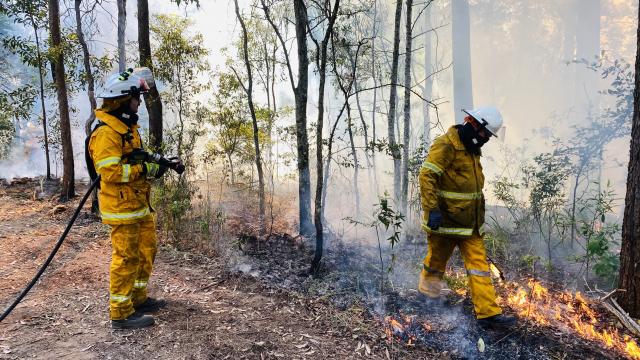Sunshine Coast Council’s annual planned burn season began this month with 13 sites across the Coast earmarked for treatment.
Alexandra Headland, Peregian Springs, Mountain Creek, Tanawha, Diamond Valley, Buderim, Caloundra, Landsborough, Little Mountain and Caloundra West will undergo planned burns before September, if conditions are suitable.
Sunshine Coast Council Environment and Liveability Portfolio Councillor Maria Suarez said council’s proactive Bushfire Management Program aimed to protect the community and enhance the environment.
“Planned burns help reduce the amount of forest fuel in targeted locations before the spring bushfire season and usually take place in the cooler months so the fires are less intense and more manageable compared with a potential unplanned bushfire,” Cr Suarez said.
“With more than 60 per cent of council’s bushland relying on fire to thrive, regenerate and maintain healthy wildlife populations, periodic fire is important to the health and survival of our forests and the animals that have adapted to live in them.
“Plants include some threatened species of eucalypts, tea-trees and wattles, and the iconic and now endangered wildflower, Christmas bells.
“Residents near the nominated burn locations should keep an eye out for advance notice of activity in their area, keep windows and doors closed when burns are planned and ensure any respiratory medications are close to hand.”
Sunshine Coast Council Fire Management Officer Guy Morgan said a trained council team worked hard to plan and prepare for burns and monitored the weather closely, waiting for the right conditions.
“Low intensity, patch mosaic burning is used to reduce the impact on native animals and achieve these desired ecological outcomes,” Mr Morgan said.
“This allows animals to escape through the unburnt edges and natural features such as gullies and generally leaves 25 to 60 per cent of an area unburnt, providing animals with areas for refuge.
“We also rake around the base of significant animal habitat trees and those with important cultural values to ensure these trees are protected from the fire – some are hundreds of years old – and undertake pre- and post-fire monitoring on vegetation and associated wildlife habitat.
“Again this season, council will collaborate with other agencies such as the Queensland Fire and Emergency Services and the Queensland Parks and Wildlife Service undertaking regional fire mitigation planning, disaster management and fire operations.
“Council will also continue to work alongside the local Kabi Kabi and Jinibara First Nations peoples to share skills and knowledge relating to bushfire management.”
Residents who live adjacent to the burn locations will receive a notification letter at the start of the season.
Signage on the surrounding streets will be in place in the days before the burn.
All burns follow conditions issued under a Queensland Fire and Emergency Services’ permit to light fire.
Where a fire can’t be undertaken due to inappropriate conditions for burning, it may be rescheduled for another time depending on regional priorities.
Vegetation management, including mowing and slashing forms a large part of council’s bushfire mitigation program adjacent to council reserves. Slashing is not directly managed by the bushfire management team.
Delays in fire break maintenance may occur during wet or very dry conditions and will be scheduled automatically when site conditions improve.
Community safety:
– Any threats to life and property call 000 (triple zero).
– Any residents affected by smoke are advised to close windows and doors, utilise air-conditioning and keep respiratory medication close at hand. Seek medical advice if you are susceptible to smoke impacts.
– As a precaution, road users are advised to drive to suit conditions as there is potential for smoke to reduce visibility.



![[READER COMPETITION] – Win tickets to the Queensland Ballet at The J Theatre](https://noosatoday.com.au/wp-content/uploads/2025/07/Queensland-Ballet-100x70.png)



